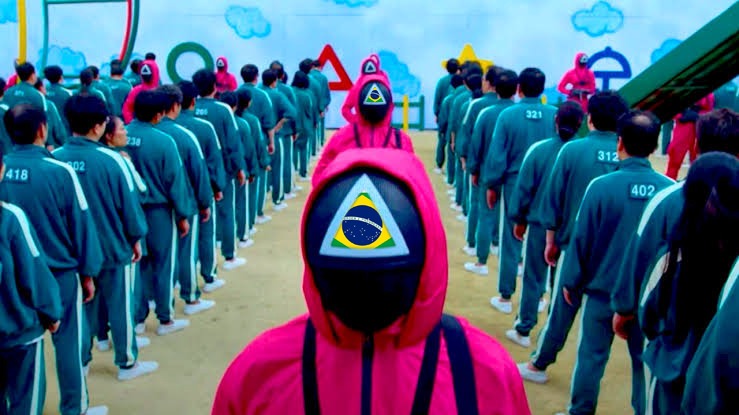ROUND 6 in a legal perspective of the Brazilian Judiciary.
Round 6. Photo : Brazilian Flag adaptation by Niyi Fote/Thenews2

Anyone who has watched the Korean series Round 6 on Netflix, directed by Hwang Dong-Hyuk, has most likely faced a paradoxical experience between fascination and disgust. The scenes are strong, referring to a saga of a ruthless game that does not admit failures of its participants, competitors for a millionaire prize, which reveals itself as the last chance to rescue their dignity. The players are people who in the social sphere were economically, morally and psychologically unsuccessful, leaving them with no better luck than the bloody bet.
In spite of the bloody narrative, a significant set of teachings and reflections on life are extracted from the aforementioned series, leading us to a deeper deontological approach. Looking into the theme, the existing inequality between players is vehemently perceived, which we could understand, from a legal perspective, due to the absence of equal treatment[1].
On the other hand, it is necessary to denote the impiety imposed on the players by those who control the game. There is no other understanding of this aspect than the expressive contempt for human life. Constantly during the Korean “death game”, we see players begging for their lives, in the face of last breath, for the simple fact of making small mistakes.
Nevertheless, there is frequent manipulation of the “rules of the game” perpetrated by controlling ruses, which reveal their spurious hecatomb intention.
Drawing a parallel between the Round 6 series and our Judiciary, although sad but necessary to say, it is possible that, at times, we are in a reality very close to Round 6.
The Judiciary Branch, far from being a game, brings together parties that need an answer to their legal problems. In the overwhelming majority of times, shunning the adventures, those who are willing to move the jurisdictional machine or defend themselves from it do so out of extreme necessity.
In the search for or defense of rights, one also fights for dignity.
And it is for this reason that the judicial provision must be effective. It is true that our Federal Constitution of 1988 prescribes such an obligation, which is materialized by the effective jurisdictional provision driven by its due and legal operators.
But it is not always that this answer is presented in an effective way.
It is clear that in the Judiciary we find cases that go far beyond the economic aspect, a neuralgic point of the Korean series, however, the jurisdiction will always be allied to the maintenance of their dignity.
We live in times when we witness in the Brazilian Judiciary acts and decisions that are completely antagonistic to those necessary for the due legal process and the good performance of the Justice.
In this wake, we have a dark recent history. From the “series” of the biggest scandals in the history of the Brazilian Judiciary, we reached the point of seeing the judge and prosecutors of the Republic in clear procedural articulation, through private messages from whatsapp, as if they were part of the same prosecuting body, in flagrant disregard for the “rules of the match”.
Observing cases like this, inexorably, leads us to severe questions about the democratic values of the Judiciary.
Are we really being judged by impartial judges?
Last week the TJSP denied freedom, on two occasions, to a Mother arrested for stealing two packages of noodles, two soft drinks and a package of juice, in an evident theft that took place on September 29th.
Perhaps coldness can invade the souls of some, revealing the lack of cultural training added to inhumanity, possibly in the face of the hardships of life, in addition to the complex social problems in which we live, in addition to the exhausting professional race that we all face daily, however, the fact is that little by little we are losing the pure and simple essence of Law.
But we don’t need to travel a long distance.
In fact, with each bitter and unfair decision of “mere annoyance” and “no urgency is seen”, for example, a jurisdiction is “annihilated”.
What is perceived is a difficult “survival” system.
In this vein, I also could not fail to register here a recent personal experience in a case of my defense. In the criminal area, we postulated through the hearing of a key witness, which was promptly dismissed by the judge. Coming up through the filing of habeas corpus in the Court of Justice, on the grounds of curtailing the defense, the Rapporteur, upon “analyzing” the preliminary injunction, issued the following decision: “… I reject… Such elements, at first evidence, are sufficient to support, for now, the patient’s provisional arrest…[2]”
That is, the decision dealt with a matter absolutely foreign to the request contained in the mandamus, revealing the complete absence of analysis, in latent disregard for the due jurisdictional provision.
That’s how dignity is destroyed.
But it is clear that the lawyer must be uncompromising with injustice and illegality.
As the late Rui Barbosa said: “The lawyer is of little value in calm times; its great role is when it needs to challenge the power of despots, presenting before the courts the supreme character of free peoples.”
Yes, yes, we will not give up. Hand in hand until the last step.
What will the next round be?
Erick Dionisio
Brazilian Criminal lawyer for Thenews2







